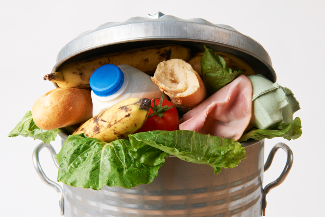Member State Page : Germany
Last updated on the 25/04/2025

Per capita: 131 kg in 2021
In total: 10.94 million tonnes in 2021
10.78 million tonnes in 2022

Primary production: 0.2 million tonnes in primary production in 2021 (2% of the total amount)
Food processing: 1.5 million tonnes in processing in 2021 (14%)
Trade: 0.8 million tonnes in trade in 2021 (7%)
Out-of-home catering: 1.9 million tonnes in 2021 (17%)
Private households: 6.6 million tonnes in 2021 (60%, about 79 kg food waste per person)

National target: Reduce food waste by 30% by 2025 and by 50% by 2030 at the retail and consumer levels | Reduce food losses along production and supply chains, including post-harvest losses.
Target
Through its national strategy for food waste reduction, Germany is committed to meeting Sustainable Development Goal (SDG) Target 12.3. As a first step, the strategy defines specific targets for reducing food waste in the retail sector, for the away-from-home consumption stage and for private households, in accordance with SDG 12.3. In these sectors, food waste must be reduced by 50% by 2030. The Federal Ministry of Food and Agriculture (BMEL) and the signatory associations of the ‘General agreement on the reduction of food waste’ work jointly towards achieving the indicative targets of reducing food waste by 30% by 2025 and by 50% by 2030 at retail and consumer levels.
Measure
The Inter-ministerial Working Group Indicator SDG 12.3 is an important instrument for Germany’s national strategy. The group is composed of members from relevant federal ministries and subordinate authorities. It meets to consult about issues related to food waste monitoring.Before the first reporting of food waste levels in Germany to the EU Commission in June 2022, consultations focused on the development of an appropriate methodology in accordance with the Delegated Decision (EU) 2019/1597 and the Implementing Decision (EU) 2019/2000. Now the working group focusses on developing a time-series indicators of food waste in Germany.
In 2019, prior to the first reporting to the EU-Commission, the Johann Heinrich von Thünen Institute (the Federal Research Institute for Rural Areas, Forestry and Fisheries) and the University of Stuttgart cooperated within the scope of the REFOWAS project, funded by the Federal Ministry of Education and Research (BMBF). The project took the most appropriate data available at that time as a basis for determining the quantity of food waste produced in Germany for 2015.
Additionally, the BMEL funded a survey (2016-2017) conducted by a consumer research organisation to determine the types of food discarded in private households. The survey also looked into the reasons why food was discarded and into the disposal paths used. The survey was repeated in 2020 in order to be able to trace developments.
Act
The national strategy for food waste reduction (February 2019) is being refined and developed.
The national strategy is implemented with the participation of actors across the food supply chain, from primary producers to consumers. Through BMEL funded dialogue forums actors of the food supply chain were brought together. These forums were composed of various stakeholders, e.g. representatives from the agricultural sector, the food and nutrition industry and the catering and hotel sectors, whose umbrella organisations committed to reduce food waste by adopting a general agreement. Representatives from the Federal and Laender authorities, as well as from research and civil society, also participate in the dialogue forums.
The forum for the out-of-home consumption was finalized in 2021, marked by the adoption of an agreement that sets out the targets for food waste reduction and that defines relevant measures in the sector. Food business operators can enter this target agreement by making voluntary industry commitments. A dedicated competence centre for this sector funded by the German Government coordinates the follow-up process. The dialogue forums for primary production and processing as well as the dialogue forum for wholesale & retail trade were finalized by the end of 2022. In the primary production and processing dialogue forums, reduction measures were identified in sector-specific round tables and implemented in different demonstration projects. In the wholesale and retail dialogue forum, the participating companies from the sector identified and adopted effectives approaches and concrete reduction measures. As a result, the Federal Ministry of Food and Agriculture has concluded an agreement on the reduction of food waste with 14 wholesalers and retailers. The forum for private households develops and evaluates promising interventions that – beyond raising awareness about the relevance and the impact of food waste – may help consumers reduce food waste at home and encourage the adoption of sustainable dietary habits.
In addition, it is being considered whether legislative changes are required in order to make the strategy more binding, as was agreed in the new coalition agreement of 2021.
Other important aspects are examining tax breaks and benefits under liability law in order to further facilitate food donations. The main goal, however, is to prevent surpluses from being generated in the first place and to structure the food supply chain in all sectors in such a way that food waste is avoided at all stages — to achieve that, all stakeholders must change how they operate.
To make it easier for food businesses in Germany to donate food, the BMEL already publishes Guidelines on redistributing food, which clarify the existing legal framework. At the moment, additional simplifications will be discussed in an expert report. To improve food redistribution from businesses to food banks the Federal Ministry of Food and Agriculture funds digitalisation projects to optimize distribution and logistical processes.
Increasing consumers’ appreciation for food and raising awareness about the social, ecological and economic impacts of food waste is a particular concern of the Federal Government. Such actions are carried out under the ‘Too good for the bin!’ initiative, a key element of the national strategy for food waste reduction. ‘Too good for the bin!’ provides information on relevant topics (e.g. on the environmental impacts of food waste, on date marking etc.) and it aims to change consumer behaviour by providing instructions, recommendations and tools for need-based food shopping, proper food storage, the use of food leftovers and foodstuffs with minor flaws.
Relevant information is made available on the initiative’s website, as well as via press and social media. The website also provides school materials about food waste reduction for years 3-6 and 7-9. A strategy-specific logo has been developed, which can be used by partners to communicate about their food waste prevention activities. ‘Too good for the bin!’ and the dialogue forum for private households cooperate closely to further develop the initiative.
Moreover, a nationwide awareness-raising week ‘Germany saves food!’ was established in 2020. It is conducted yearly around the IDAFLW in order to reach better appreciation of food in the civil society.
Furthermore, food waste prevention and reduction measures have also been integrated into other policy areas. For example, relevant actions are included in the national Circular Economy Act, which sets out the overarching framework for all waste prevention and reduction activities, and in the national food and nutrition policy, which promotes healthy and balanced diets as well as food sustainability aspects. Activities in the field of climate and sustainability policy also include the prevention and reduction of food waste. Examples include the German sustainability strategy that transposes the United Nations’ Sustainable Development Goals into national measures; the 2050 climate action plan aiming to reduce CO2 emissions across the food supply chain as well as in the national bioeconomy strategy.
The Federal Government advocates for the prevention and reduction of food waste to be considered at European and international level, e.g. at G20 Agriculture Ministers’ Meetings, the Global Forum for Food and Agriculture and dialogues with international organisations and partner countries
